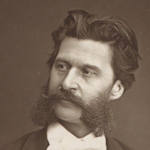
If you arrived in Vienna by plane, the airline may well have played The Blue Danube over the loudspeakers as you landed. The man who wrote that waltz is the legendary Johann Strauss (II). And he wrote it in an apartment you can visit.
- Small museum with pictures, manuscripts, and a few stunning original items belonging to Strauss
- The composer lived here in the late 1860s and early 1870s
- Book a concert experience* in Vienna
- See also:
- Strauss in Vienna
- Mozart & Strauss concerts for visitors
- House of Strauss
- One-time free entry with the Vienna All-inclusive Pass
The Johann Strauss Wohnung
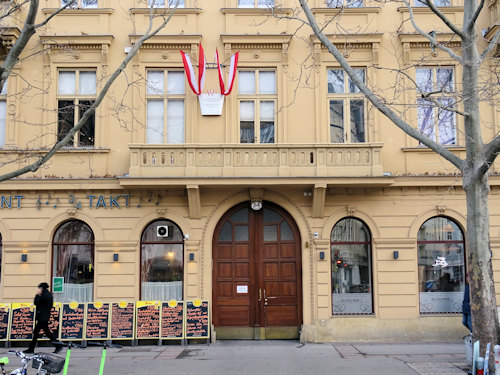
(The entrance on Praterstraße)
A fair few Viennese musicians left their stamp on the history of music. Even if some weren’t truly Viennese (Mozart was born in Salzburg and Beethoven in Bonn, for example, though both spent their most productive years in Vienna and died here).
Johann Strauss, however, counts as a true son of the city, and his music has filled the ballrooms of Vienna and the wider world for decades. 2025 will even be a dedicated Strauss year in honour of his 200th birthday.
Strauss produced music for various formats, including operettas like Die Fledermaus. But his most well-known piece must be the iconic waltz The Blue Danube.

(Exhibition view inside the Strauss apartment with his piano at the centre and violin in the far right corner; press photo by Lisa Rastl and © Wien Museum)
The first performance took place on February 15th, 1867, in a version for choir and orchestra. Such was the enthusiasm of the audience that they demanded (and got) an immediate second rendition. And so began the success story of one of the world’s most recognisable pieces of music.
Imagine, then, standing in the very apartment where Strauss wrote that waltz.
The Johann Strauss Wohnung is one of many musician apartments maintained for the public by the Wien Museum.
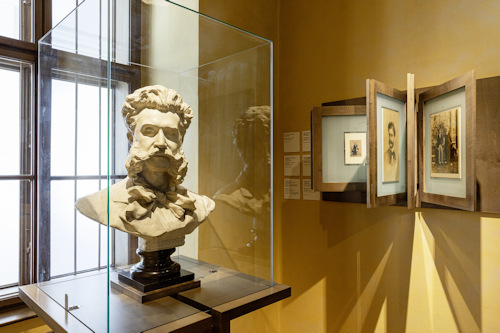
(A Strauss bust inside the apartment, sporting the iconic facial hair; press photo by Lisa Rastl and © Wien Museum)
The “King of the Waltz” lived here from the mid-1860s to the early 1870s, and the front-facing rooms of the apartment now house various exhibits illustrating the life and work of the great composer and orchestral entrepreneur.
Numerous photos, pictures, autographed manuscripts and other documents (mostly reproductions for conservation reasons) highlight selected aspects of the Strauss history and legacy.
So, for example, portraits fill one room.
It’s rather rewarding to see some pictures of Strauss beyond the traditional image established through postcards and statues. Though, to be fair, the moustache seems to have been a constant: I suspect he was born with it.
The displays give you a strong impression of musical life in the late 19th century. You can even listen to various performances of Strauss’s music (including The Blue Danube, of course) in a room dedicated to that purpose.
Should you, however, wish to hear that music with a live orchestra in one of Strauss’s old concert hall haunts, then try these suggestions.
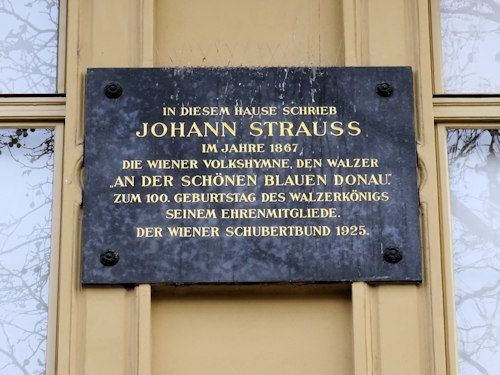
(A plaque outside the apartment notes this is where Strauss wrote The Blue Danube)
What stand out for me are the memorabilia from Strauss’s own household. For example:
- His sheet music cabinet built in the early 1860s: you can only imagine what creative wonders lurked within
- The standing desk built in the early 1880s that he used for composing
- A grand piano gifted to him by Bösendorfer in 1896
- A violin display case and, inside, what is almost certainly one of Strauss’s own instruments: an early 17th-century Amati violin
- A home organ from the early 1880s that Strauss presumably used for late-night compositions, since it could be played very quietly
(Mind you, can you imagine banging on your ceiling asking the maestro to keep it down? I think not.)
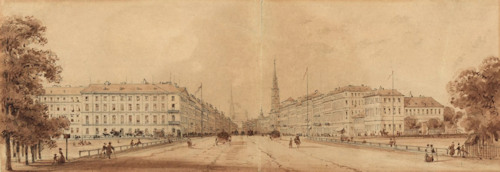
(The Praterstraße as it might have looked in Strauss’s day, with a view down to the cathedral: Rudolf von Alt (Artist), around 1850, Wien Museum Inv.-Nr. 78115, excerpt reproduced with permission under the terms of the CC0 licence)
Tickets & visitor tips
At the time of writing, a standard adult ticket costs €5. A Vienna All-Inclusive Pass from Go City (my review) gets you in once for free.
As this is an apartment, don’t expect too much incidental infrastructure. Note that all written information on walls and labels appeared in both German and English on my visit.
The location on Praterstraße also means you’re just a short walk from the huge Prater park and entertainment complex, home to the Riesenrad giant Ferris wheel, Madame Tussauds, a giant fun park, restaurants, woodland walks, Instagrammable architecture, and much more.
For more Strauss-related locations in the city, try this guide. In particular, the House of Strauss in Casino Zögernitz (not an actual casino) has a large interactive exhibition on the music and history of the wider family.
How to get to the Strauss Wohnung
On public transport, simply get on the U1 subway line and get off at Nestroyplatz station.
Exit the station in the direction away from the city centre and follow the signs for the Praterstraße exit. Once outside, the house with the Strauss apartment is immediately on your right.
Go into the courtyard through the door facing the street and on the right hand side a door opens into the building proper.
To go inside, ring the bell marked Strauss Wohnung and push the door once the buzzer sounds. The Apartment is on the next floor up (accessible via stairs or a lift).
Address: Praterstraße 54, 1020 Vienna | Website